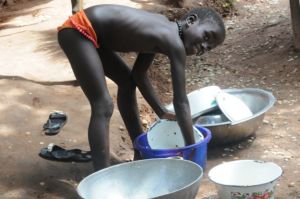Something that can cause a problem for students learning English are the verbs ‘do’ and ‘make’. One possible reason can be that in the student’s mother tongue language, only one verb is used instead of two. One example of this can be found in Portuguese where the verb ‘fazer’ is used interchangeably. A good starting point here is to consider if what is being described.
‘Make’ refers to a result

We make a cake.
We make friends.
People make decisions.
I will make dinner.
‘Do’ refers to a process

Before class, I hope you do your homework.
It is necessary to do the laundry at least twice a week.
If you do the pasta, I will do the vegetables.
On cleaning the house, Stephen decided to do the living room first followed by the kitchen.
Below are some expressions that always use ‘do’ or make’. When looking at these, it can help to consider if we are describing a process or result. In the event of being unsure, maybe try remembering the expression.
On Wednesday, it is Fred’s turn to do the washing up.
Washing up is the process of cleaning plates, cups, cutlery and similar. We do not wash up clothes, we wash clothes.
On Saturday we all must do the laundry.
Laundry is the process of washing things like clothing, bed clothes (sheets and blankets) and towels etc.
Susan is incredible, she always makes me laugh!
To make progress, it is important to stay focused on the task.
Bob is depressed. He thoroughly believes that he always makes a mess of things.
Make up your mind once and for all, stop changing your mind and annoying everybody!
_____

What about your day?
What did you do recently?
What will you make before the end of the week?
_____
Professional English classes with a native British CELTA qualified teacher

